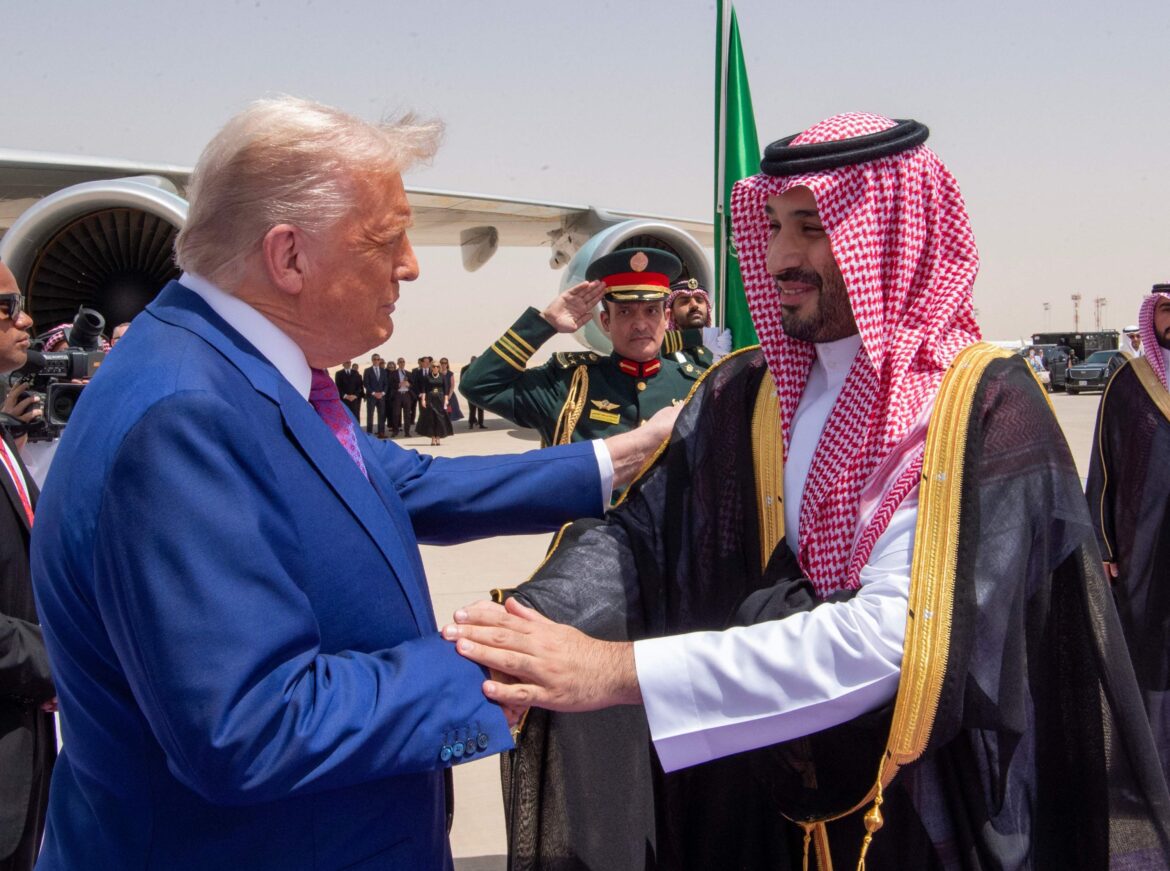By Reuters
RIYADH, May 13 (Reuters) – U.S. President Donald Trump arrived in Saudi Arabia on Tuesday at the start of a four-day visit to the wealthy Gulf region, focusing more on economic deals than regional security matters ranging from war in Gaza to talks on Iran’s nuclear program.
With a who’s who of powerful American business leaders in tow, Trump is visiting Riyadh, site of a Saudi-US Investment Forum, before going to Qatar on Wednesday and the United Arab Emirates on Thursday. He has not scheduled a stop in Israel, a decision that has raised questions about where the close ally stands in Washington’s priorities.
The Reuters Tariff Watch newsletter is your daily guide to the latest global trade and tariff news. Sign up here.
“While energy remains a cornerstone of our relationship, the investments and business opportunities in the kingdom have expanded and multiplied many, many times over,” Saudi Investment Minister Khalid al-Falih said as he opened the forum.
“As a result … when Saudis and Americans join forces very good things happen, more often than not great things happen when those joint ventures happen,” he said before Trump’s arrival.
Trump is hoping to secure trillions of dollars of investments from the Gulf oil producers. Saudi Arabia had pledged $600 billion but Trump has said he wants $1 trillion from the kingdom, one of
The Saudi-US Investment Forum began with a video showing soaring eagles and falcons and celebrating the long history between the United States and the kingdom.
At the front of a palatial hall sat Larry Fink, the CEO of Blackrock, Stephen A. Schwartzman, CEO of Blackstone, Treasury Secretary Scott Bessent, and Saudi Finance Minister Mohammed Al Jadaan and Falih.
Speaking at a forum panel as Trump touched down in Riyadh, Fink said he had traveled to Saudi Arabia more than 65 times over 20 years. While the kingdom had been a follower when he first started visiting, it was now “taking control” and broadening its economy out of its oil base, he said.
After landing, Trump punched the air when he caught sight of Crown Prince Mohammed bin Salman, also known as MbS, before shaking hands with the de facto leader.
MbS has focused on diversifying the kingdom’s economy in a major reform programme dubbed Vision 2030 that includes “Giga-projects” such as NEOM, a futuristic city the size of Belgium.
The kingdom has had to scale back some of its lofty ambitions as rising costs and falling oil prices weigh.
LONG TIES BASED ON OIL AND SECURITY
Saudi Arabia and the U.S. have maintained strong ties for decades based on an ironclad arrangement in which the kingdom delivers oil and the superpower provides security.
Trump has also said he may travel on Thursday to Turkey for potential talks between Vladimir Putin and Volodymyr Zelenskiy on Russia’s war in Ukraine. An aide to Zelenskiy said the Ukrainian president would take part only if Putin does. The Russian leader has not said if he will attend, and has questioned Zelenskiy’s legitimacy.
Trump’s second foreign trip since returning to the presidency in January – his first was to Rome for Pope Francis’ funeral – comes at a time of geopolitical tension.
In addition to pressing for a settlement in Ukraine, his administration is pushing for a new aid mechanism for Gaza after 19 months of war and urging Israeli Prime Minister Benjamin Netanyahu to agree a new ceasefire deal there.
Israeli officials have put a brave face on Trump’s decision to bypass Israel during his trip but there are growing doubts in Israel about its position in his priorities as frustration mounts in Washington over the failure to end the Gaza war.
Over the weekend, U.S. and Iranian negotiators met in Oman to discuss a potential deal to curb Tehran’s nuclear program. Trump has threatened military action against Iran if diplomacy fails.
Iran’s Nournews quoted armed forces chief of staff Mohammad Bagheri as saying on Tuesday that Iran’s neighbours should retain neutrality and that any aggression against Iran would lead to definitive retaliation.
Trump is expected to offer Saudi Arabia an arms package worth more than $100 billion, sources told Reuters. This could include a range of advanced weapons.
Trump’s Middle East envoy, Steve Witkoff, said last week he expected progress imminently on expanding the Abraham Accords, a set of deals brokered by Trump in his first term by which Arab states including the UAE, Bahrain and Morocco recognised Israel.
But opposition by Netanyahu to a permanent stop to the war in Gaza or to the creation of a Palestinian state makes progress on similar talks with Riyadh unlikely, sources told Reuters.


